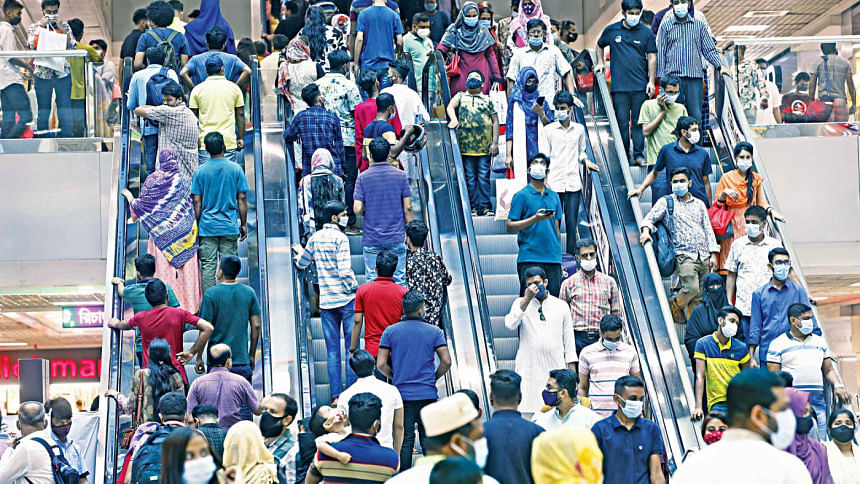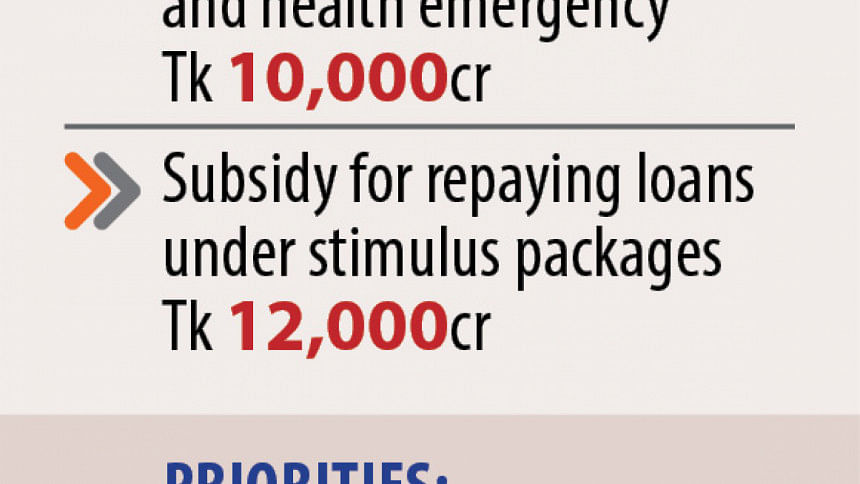Pandemic to be budget mainstay

Keeping in mind the possible impacts of the second Covid-19 wave, the government is going to attach top priority to vaccination, economic recovery, and life and livelihood of the poor in the upcoming national budget.

The size of the next budget, due to be placed in parliament on June 3, is likely to be Tk 602,880 crore, 6.14 percent higher than the original budget of Tk 568,000 crore for the current fiscal year, according to a draft budget proposal.
It will be finalised today at a meeting between Prime Minister Sheikh Hasina, Finance Minister AHM Mustafa Kamal and top officials of the Finance Division, said finance ministry officials.
"The meeting will discuss the size of the next budget, priorities for fiscal 2021-22, revenue collection and measures to revive the economy amid the second wave of Covid-19," a top official at the ministry told The Daily Star yesterday.
"Though there will be some new special measures, the next budget will be a traditional one," said the official, seeking anonymity.
According to the proposal, the government will set aside Tk 35,000 crore in the next budget for the health sector. The allocation is Tk 29,246 crore for the current fiscal year.
The budget will be placed at a time when the economy, already struggling to recover from the impacts of the first wave of the pandemic, is hit by a resurgence of Covid.
The second Covid wave prompted the government to enforce a nationwide shutdown, dealing a massive blow to the poor and low-income groups. The crisis has put the government in a precarious situation as it is trying to save the lives of citizens on the one hand and revive the economy to protect the livelihoods of millions on the other.
Against such a backdrop, economists say the next budget should focus on crisis management, prioritising spending on health, enhancing social protection and building on the resilience demonstrated by the agriculture sector.
Apart from enhancing the health system's capacity, priority should be given to vaccine diversification in terms of procurement and local production, they point out.
"A business-as-usual budget like last year's will miss the boat again," said Zahid Hussain, former lead economist at the World Bank's Dhaka Office.
"There is a lot to learn from the implementation experience in health and social protection. Last year, we did not have the benefit of knowing what we know now about how the policy response to the pandemic works and where the fault lines are," he told this newspaper.
Binayak Sen, director general of Bangladesh Institute of Development Studies, said that in the next budget, special attention should be given to public health, social protection, especially in urban areas, and also agriculture.
TOP PRIORITIES
One of the top priorities of the next budget will be to continue the mass vaccination programme, say finance ministry officials.
The government will make a block allocation of Tk 10,000 crore for procuring Covid vaccines to reach the target of inoculating the eligible citizens free of cost. Besides, the money will also be used to meet emergency requirements in the health sector and take up special programmes for the poor, according to them.
The government allocated the same amount of money in the current budget for health emergencies. It has already spent Tk 3,500 crore that included a payment of Tk 1,200 crore to the Serum Institute of India for Oxford-AstraZeneca vaccine.
To roll out Covid vaccination as early as possible, the government signed a tripartite deal with Serum and Beximco Pharmaceuticals Limited in November last year to buy three crore doses of the vaccine scheduled to arrive in six monthly instalments.
Serum delivered 70 lakh doses in two consignments in January and February this year. It stopped supplying jabs after the Indian government restricted vaccine export in March amid a surge in virus infections in that country.
As a result, the vaccination programme in Bangladesh suffered a setback. The authorities stopped administering the first jab in late April, about three months after mass inoculation started in early February. Registration for jabs was also temporarily suspended due to a shortage of vaccines.
Amid uncertainty over further shipments, the government recently approved China's Sinopharm and Russia's Sputnik V vaccines for emergency use. It is in talks with Russia over purchase of Sputnik V.
Around five lakh doses of Sinopharm vaccine are likely to arrive from China tomorrow.
Referring to the vaccination campaign, Zahid said, "Vaccination should be the priority number one."
He further said the strategy to rely solely on one country and one domestic distributor has brought many regrets, including a weaker bargaining power in negotiating vaccine import and production deals.
Apart from vaccination, testing, contract tracing, preventing transmission, treating the infected ones, and non-Covid care deserve a lot of budgetary care, he noted.
Binayek said, "We should seriously think about our own vaccine production and encourage vaccine diversification."
Seeking anonymity, a finance ministry official involved in budget formulation said, "No matter whether we go for local production or procurement, vaccines are going to get the highest priority in the next budget."
The health sector would also get significant importance, the official mentioned.
ECONOMIC RECOVERY
There will be continuation of some programmes in the upcoming budget to revive the economy and rehabilitate the industries as well as the poor and low-income people affected by the pandemic.
One of those is economic stimulus package. The government has so far rolled out 23 packages, which have been provided in the form of food security, social protection, special allowances and low-cost loans to micro, small, medium and large industries.
The duration of the large packages will end next month. The government is likely to extend the duration of most of those by one to two years.
It will also allocate around Tk 12,000 crore as subsidy to help borrowers under the packages pay interests on their loans.
The total outlay of the packages is now Tk 124,053 crore, which is 4.4 percent of the country's GDP. Around 65 percent of the amount was disbursed till March this year.
FISCAL SUPPORT FOR THE POOR
In the next budget, the government will allocate Tk 19,000 crore under social safety net programmes for providing food support to the poor. The allocation is over Tk 17,000 crore in the current fiscal year.
Various studies by think-tanks suggest that the pandemic rendered jobless a huge number of people, especially in the urban service sector, making them new poor.
A study by Power and Participation Research Centre and the Brac Institute of Governance and Development said the economic shock induced by the pandemic pushed 2.45 crore people into poverty in one year.
To help them in this crisis, the government will take up special programmes in the budget. It will bring all elderly poor, widows and destitute women in 150 poverty-stricken upazilas across the country under social safety net programme.
It will also implement safety net programmes involving Tk 100,000 crore in the upcoming budget, said finance ministry officials.
Economists suggest that the government should identify and reach out to the real beneficiaries through a combined effort, engaging all stakeholders so that none of the affected or vulnerable poor people is left out.
Binayek said, "If we can achieve a stable 5-6 percent growth rate with broad-based healthcare for all, social protection for the poorest and the new poor, and robust agricultural growth in the next two-three years, this will be good for the economy and for the citizens."


 For all latest news, follow The Daily Star's Google News channel.
For all latest news, follow The Daily Star's Google News channel. 



Comments